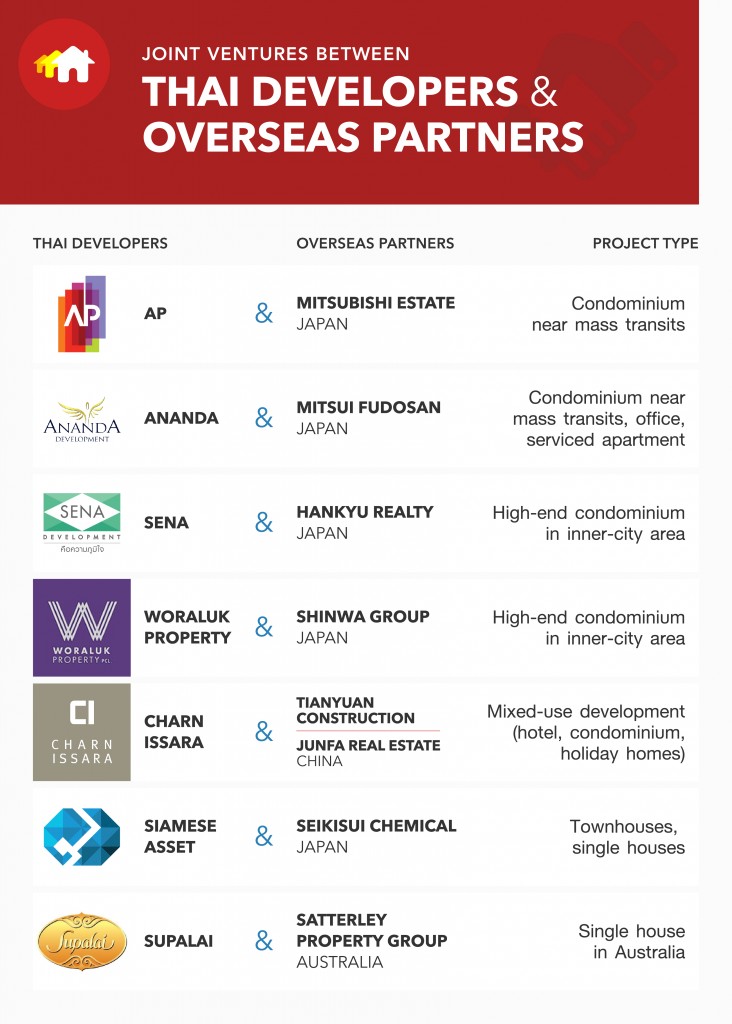[Special Scoop] The media has stated multiple times that 2017 will be the starting point of a real estate turnaround in Thailand. During the next couple of years, the industry will become more competitive as developers will be competing to acquire land plots near the upcoming mass transit lines, which are being extended all over Bangkok. For that reason, leading Thai developers have joined hands with reputable overseas firms to increase their ability to compete amid the rise in competition.
At the same time, those partners, mainly from Japan and China, are looking for investment opportunities in Southeast Asia’s growing real estate market. Thailand is seen as an ideal location to start with a number of joint ventures already having been agreed upon.
Ananda Development PCL was one of the 1st developers to start the joint venture trend when it joined hands with Mitsui Fudosan Residential Company Limited, the largest property development company in Japan with a market capitalisation of over THB 1 trillion. The pair have launched 3 upmarket joint venture condominiums, Ideo Q Chula-Samyan, Ashton Asoke, and Ideo Q Siam – Ratchatewi. They are now looking to move forward in the hotel and serviced apartment sectors.
AP (Thailand) PCL also partnered with a Japanese company for a joint venture arrangement. It struck a deal with Mitsubishi Estate Co., Ltd. in 2014 to set up a joint venture parent company, Premium Residence Co., Ltd., with registered capital of THB 6.1 billion. Since the joint venture began, the partnership has developed projects worth THB 47 billion, and is now looking to launch 2 more developments this year, Life One Wireless and Life Ladprao.
Charn Issara Development PCL signed a joint venture deal with Junfa Real Estate Co., Ltd., a China-based developer. They launched a mixed-use project in Phang Nga, Baba Beach Club Phuket. It also has another joint venture with Tianyuan Construction Group, a Chinese contractor, who will help build a condo in Chiang Mai worth THB 1.2 billion.
Meanwhile, Siamese Asset Co., Ltd. has teamed up with Sekisui Chemical, a Japanese-based company, to launch a modular-home project on Ram Intra Road. Modular homes are a pre-fab, or factory-made home, which comes with a lower production cost but has greater attributes including earthquake resistance, outdoor noise insulation, heat-transmitted reduction, low water absorption, and firm structure.
Supalai PCL, after having success in launching projects in the Philippines, is now launching more projects in Australia. The company chose the country due to its population of mainly high-income consumers with high purchasing power. Moreover, the economic conditions in the country are also healthy and the company sees potential growth in this overseas market.
Sena Development PCL partnered with Hankyu Realty Co., Ltd, subsidiary of Japan’s Hankyu Hanshin Holdings Group. Sena Development and its Japanese partner set up a joint venture company, Sena Hankyu 1, aiming to penetrate the high-end, city condominium segment in Bangkok. The Japanese firm had been planning to invest in Southeast Asia long before this joint venture with Thailand being selected as the starting location. It will also look to expand to other neighboring countries in the future. Hankyu Hanshin Holdings Group chose Thailand due to the country’s infrastructure advancements and expanding mass transit network that indicates potential growth in the property market.
The last joint venture to take note of is between Woraluk Property and Shinwa Group who introduced a luxury low-rise project on Thonglor Road. The new development has a “Runesu structure” and a unique design with a hidden space underneath the floor, which can increase usable area by up to 40 per cent. Shinwa Group, a Japanese firm, also sees Thailand as a starting point before expanding to other regions. The Japanese company has set up another joint venture in Thailand. It hooked up with Shinwa Development Thailand Co with plans to enter the construction business in 2018.
The joint venture arrangements with overseas companies allow the partners to share know-how and complement each other while helping marketing efforts. It is important for developers to expand business further and build sustainable growth for the long run, especially during this time when the industry is facing greater competition and economic uncertainties.
Receive the latest property news on email from Thailand’s No.1 property website here, or read more project reviews




